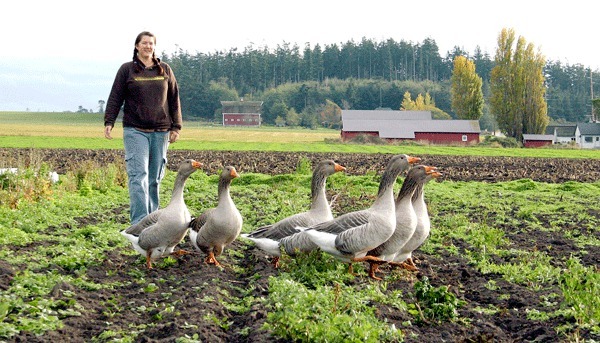Pioneer Farm owner Dale Sherman spent the past several months negotiating a deal that provided a major boost to his squash growing operations. He is selling his sugar Hubbard squash to Whole Foods, an upscale grocer with 13 locations throughout Washington.
Sherman is one of several farmers based within Ebey’s Landing National Historical Reserve who have had to adapt their businesses to succeed, which, in turn, helps preserve the rural heritage of the country’s first historical reserve.
A celebration marking Central Whidbey’s rural heritage takes place this weekend at the Ebey’s Forever Conference.
Sherman’s staff recently spent a day preparing approximately 2,000 pounds of squash to ship to the ritzy supermarket chain.
“I’m excited about that,” Sherman said Thursday morning.
He’s worked since 2006 refining his production and looking for new customers for his squash.
He said Whole Foods was interested in his Hubbard squash because of the organic growing practices he utilizes and the convenience the sliced and peeled squash provides home cooks.
The building that houses Sherman’s cutting operations demonstrates how farmers have continually adapted over the decades on Ebey’s Prairie. Sherman said the building was originally constructed in the 1930s. It was used for decades to raise chickens. During the ‘70s the Shermans used it for calves before converting it to storage in the early ‘90s.
In 2006, the red-colored building was remodeled, a wall replaced, and sinks, cutting and packaging equipment were installed. Now, it is again an integral part of his farming operation. Sherman noted the remodel was accomplished while retaining the building’s historic appearance.
There’s no need to go to Whole Foods to enjoy Sherman’s squash. He also sells his sliced squash to Payless Foods in Freeland and Prairie Center in Coupeville.
Selling direct
Another farmer on Ebey’s Landing has a slightly different business model, selling produce directly to Whidbey Island residents.
Wilbur and Julieanna Purdue, owners of Prairie Bottom Farm, have been promoting a community supported agriculture program, where residents enjoy a weekly box of produce for 22 weeks at a cost of $550.
Wilbur, who is the fifth generation of his family to farm on Central Whidbey Island, has been selling at local farmers markets for about eight years and started the CSA program about three years ago.
The Purdues are organically farming on six acres just south of Coupeville and they recently built a barn that will allow them to better store their crops.
Julieanna said they hope to increase the number of people who purchase shares in their farm to around 40. As they see it, their expanding operation will help the community move toward the goal of greater self-sufficiency.
Going organic
Karen and Wilbur Bishop have been dairy farmers on Whidbey Island for nearly 30 years. They, too, have made some changes in recent years to adapt to the changing market. They farm 600 acres on their Ebey Road Farm within the reserve. They recently obtained an organic certification for 50 acres of their land, which is a process that can take three years to complete.
They have had some hits and misses over the past several years. Wilbur Bishop said they had success growing barley a year ago, which they sold to an organic dairy on the mainland; however, the wheat the Bishops planted this year was mostly lost to disease. Bishop added that there is a potential for selling wheat in the future. Wheat farming on Central Whidbey goes back a century or more.
Have a taste
Islanders can experience some of the food that is grown and prepared on Whidbey Island by attending the Ebey’s Forever Conference this weekend at the Camp Casey Conference Center.
One of the events, A Taste of Ebey’s, will feature the food that is produced within Ebey’s Reserve to increase awareness of the variety of food grown on Whidbey Island.
“You can eat well locally and do quite well these days,” organizer Val Hillers said.
She said the Taste of Ebey’s will feature meat from 3 Sisters, the lavender-infused foods produced by Lavender Wind Farm and some noteworthy heritage grains that are being grown on Whidbey Island. She pointed out that Ebey Road Farm is growing emmer, which is an older variety of wheat. There will be other offerings as well.
The Ebey’s Forever Conference begins Friday, Nov. 5 with a Celebrating Rural Characters Potluck beginning at 6 p.m. at 1056 Crockett Barn Road.
Saturday’s activities include a plethora of workshops, children’s activities and a presentation by Anthea Hartig, director of the National Trust for Historic Preservation’s western regional office.
For more information, visit www.ebeysforever.com.



